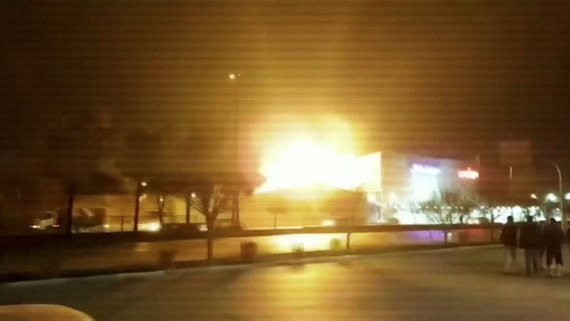Iran vows Israel ‘response’ for attack on military plant
[ad_1]

Iran accused Israel of a drone attack on a military plant in Isfahan on the night of January 29. Said Iravani, Iranian Permanent Representative to the UN, announced this on February 2 in a letter to the Chairman of the UN Security Council, citing the results of the investigation. Iravani also threatened Tel Aviv with a “response” within the framework of “international law and the UN charter.”
“Initial investigations showed that the Zionist regime was responsible for the terrorist attacks at the Defense Ministry facility in the city of Isfahan. The operation of this regime violates international laws and is condemned,” the Iranian ISNA agency quoted Iravani’s letter. Prior to that, on January 31, Iranian intelligence agencies said they identified the manufacturer of the drone based on an analysis of the hull, engine and navigation system of one of the UAVs left after the attack, the report said. However, the manufacturer of the drone was not named. According to Iranian authorities, the drones were launched with the help of separatist Kurdish organizations that may have obtained them from Iraqi Kurdistan.
Drone strikes on Iranian military facilities became known on January 31 from reports on the Al Arabiya TV channel and other Arab media. According to the Iranian Ministry of Defense, as a result of the attack by three drones, the roof of the workshop was damaged. The department added that the attack did not lead to casualties and equipment failure, one of the drones was shot down by air defense, and the other two fell into a protective net stretched over the object and exploded.
At the same time, the Arab edition of Al-Hadath, citing sources, said that the attack was on the Iranian stock of ballistic missiles and the attack was “very serious.” The New York Times, citing American intelligence sources, directly reported that the drone attack was carried out by the Israeli Mossad. According to The Jerusalem Post, it was directed against an arms depot and “achieved its goals despite the statements of Tehran.” Israel did not comment on the strikes, the Israeli Foreign Ministry refused to provide clarification, and Pentagon spokesman Patrick Ryder said on January 30 that the US was not involved in the strikes in Iran.
Russian Deputy Foreign Minister Andrey Rudenko said on January 30 that Tehran did not turn to Moscow for help in investigating drone attacks on military facilities in Iranian Isfahan.
A serious escalation in the region is now unprofitable for Israel, so its real involvement in the attacks in Isfahan is unlikely, said Dmitry Maryasis, senior researcher at the Department of Israel and Jewish Communities at the Institute of Oriental Studies of the Russian Academy of Sciences. Tehran’s accusations against Tel Aviv are another watchdog moment, but in reality, Israel’s armed actions against Iran could only be possible with the consent and assistance of the United States, which is also not possible in the current situation.
In addition, the new Israeli government has enough internal political issues and problems to deal with instead of planning an armed attack on Iran. In turn, the escalation does not meet the interests of Iran, which is also experiencing difficulties on the domestic political front, so one should not expect a significant escalation of the conflict, the expert suggests.
To understand Iran’s possible response, which its envoy to the UN spoke about, it is necessary to study in detail the motivations and capabilities of the various forces of the Iranian establishment, and then assess which of them has a greater chance of achieving the desired solution, says Adlan, a researcher at the Center for Middle East and African Studies at IMI MGIMO Margoev.
At the same time, according to him, Iran does not have such opportunities that would allow it to quickly end a full-scale war with Israel in its favor. And if someone in the Iranian leadership is interested in a protracted conflict with the main regional adversary, he must be sure that he will not only win the internal political struggle through war, but will be able, together with his opponents, to maintain the political system, thanks to which they all have power, says Margoev. If we take a sober assessment of the situation as a basis, it is difficult to imagine that in Iran and its political leadership there are many supporters of a real and direct, and not a rhetorical war with Israel, the expert concludes.
[ad_2]
Source link








